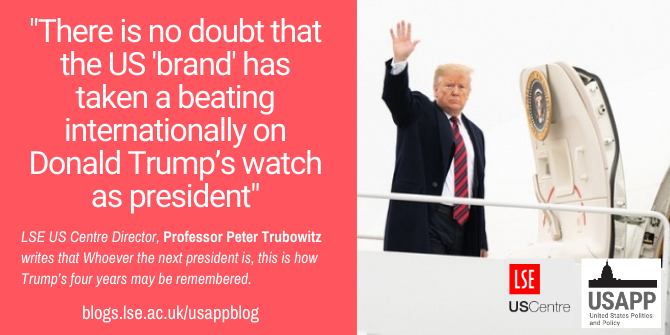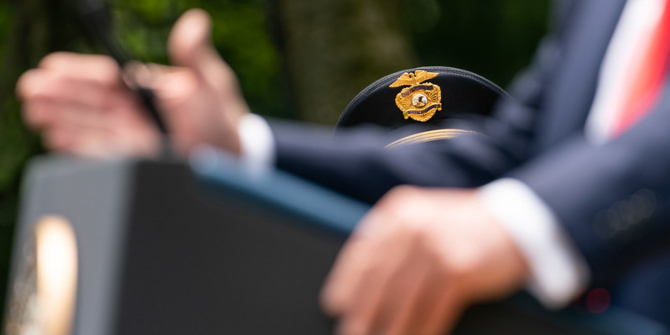 Whether or not he wins re-election, President Trump’s four years in office has had massive implications for how America is viewed by the rest of the world. In this Q&A, LSE US Centre Director Professor Peter Trubowitz reviews Trump’s foreign policy since he came to office and looks ahead to how the US’ relationship with China might change under a Biden administration, or under four more years of Trump. This Q&A is based on an interview during an event at Utrecht University 3 November.
Whether or not he wins re-election, President Trump’s four years in office has had massive implications for how America is viewed by the rest of the world. In this Q&A, LSE US Centre Director Professor Peter Trubowitz reviews Trump’s foreign policy since he came to office and looks ahead to how the US’ relationship with China might change under a Biden administration, or under four more years of Trump. This Q&A is based on an interview during an event at Utrecht University 3 November.
For you, what are the most notable moments during Trump’s four years in office?
There are so many “notable” moments that it’s hard to know where to start. Looking back on Trump’s presidency, I think perhaps the one that is worth reflecting on today is one of his first decisions or orders as President. Shortly after being inaugurated as president in January 2017, the Trump administration imposed stringent restrictions on travel to the United States for citizens of Iran, Iraq, Libya, Somalia, Sudan, Syria, and Yemen. The travel ban signaled two things that have really come to define his presidency: first, a pattern of leading through executive fiat rather than by legislative consent; and second, a pattern of playing to “his base” rather than governing from the center. The travel ban immediately polarized the country: Trump’s control over the Republican Party was strengthened, but at the price of fueling Democratic mistrust. Trump had run for the presidency as an “outsider” not beholden to either party. But the travel ban revealed a president deeply committed to partisan polarization along racial/cultural lines, and that has been the story throughout his entire presidency.
How has Trump’s foreign policy affected the role and standing of the US on the world stage?
There is no doubt that the US “brand” has taken a beating internationally on Donald Trump’s watch as president. America surely doesn’t look like that “shining city on a hill” and “beacon of hope” that Ronald Reagan used to wax on about. Trump’s harsh immigration policies, his embrace of white supremacist groups, and support for odious regimes around the world has cast America in a very negative light globally. This is evident in international opinion surveys and media stories about the United States under Trump. However, this is not the first time America’s “brand” has been tarnished or that a president has behaved in ways that harmed other peoples and countries as well as America’s strategic interests: one thinks of how badly the US played its hand over Vietnam in the 1960s and over Iraq in the 2000s. Those were both colossal strategic blunders that took a real toll on the country’s international reputation. But in both cases America found a way to revive and renew itself, and I think it is too soon to count the US out. I think under new leadership America, has a chance of reviving its international fortunes.
Do you believe Trump’s America-First policies have caused a worldwide protectionist trend?
I’ve written about this issue with a colleague, Brian Burgoon, at the University of Amsterdam. What we show is that the retreat from liberal internationalism (free trade, open borders, multilateralism) did not begin with Trump’s America First, or Britain’s Brexit, or the populist parties criss-crossing Europe today. It is part of a longer-term trend that stretches back to the triumphal post-Cold War years and is rooted in the Western democracies growing reliance on trade liberalization, institutionalized cooperation, and multilateral governance. This trend has accelerated in recent years, but Trump’s America First is as much a symptom as it is a cause. Among other things, this means these nationalist sentiments and currents will be with us going forward, even if Biden prevails.

“President Trump Boards Air Force One en route to Delaware” by The White House is Public Domain.
Throughout his presidency, Trump has consistently showed his personal admiration for Russian President, Vladimir Putin. Is there a logic to the way Trump has managed the US-Russia relationship?
Trump’s pro-Putin stance is hard to understand, strategically or politically. If the purpose is to get geopolitical leverage on China, then Trump would be better off coordinating with America’s allies on China, especially in the areas of trade, investment, and human rights. If the purpose is to build and mobilize bipartisan domestic support for his foreign policy, it is hard to think of any policy that is more counterproductive. This is one area where Republicans on Capitol Hill have not followed Trump. So one is left considering the hypotheses that many Americans ponder: that Putin has compromising information on Trump; that Trump’s investments have been financed by dark Russian money; and so on.
During Trump’s presidency tensions with China have escalated sharply. How will these tensions evolve if Trump wins the election? Would a Biden win make a difference?
One thing that Trump understood better than other US politicians is that China could be made the “poster child” or scapegoat of globalism — that China’s rise could be exploited for domestic political gain. While Trump’s use of China pales in comparison to his use of racism and xenophobia, he has played the China card with considerable success. Indeed, it is remarkable how far Trump has moved the Republican Party on China in four short years. Rarely have we seen a party do a 180 degree turn on foreign policy so quickly or completely. In 2016, to the extent that Republicans were jumping up and down about national security threats, it was Russia they were concerned about. It’s now China 24/7. What I would expect from a second Trump administration in the first 100 days is more of the same on steroids. If Trump wins, he will conclude that he can pretty much treat the outcome as a vindication of his approach toward China, the pandemic, and probably everything else.
What about if Biden wins? The temptation is to say everything will change, and that Biden will “reset” relations with China. While I would expect Biden to tone down Trump’s rhetoric on China, I think he will avoid giving Republicans an easy political target. Internationally, I would not be surprised if Biden focused on developing a more coordinated Western approach toward China. Negative views of China have spiked across the OECD, including in Germany. Domestically, I would look for Biden to push a version of the new Schumer-Mendez bill in the Senate calling for a $350 billion plan “to confront the clear and present threat China poses to our economic prosperity and national security.” This would be a way to reward sectors, companies, and initiatives connected to the Democratic Party and more broadly, move the country down the path of an industrial policy.
- This Q&A is based on an interview during an event at Utrecht University.
Please read our comments policy before commenting
Note: This article gives the views of the author, and not the position of USAPP– American Politics and Policy, nor of the London School of Economics.
Shortened URL for this post: https://bit.ly/38bBI0T
About the author
 Peter Trubowitz – LSE US Centre
Peter Trubowitz – LSE US Centre
Peter Trubowitz is Professor of International Relations, and Director of the LSE’s US Centre. His main research interests are in the fields of international security and comparative foreign policy, with special focus on American grand strategy and foreign policy. He also writes and comments frequently on US party politics and elections and how they shape and are shaped by America’s changing place in the world.






